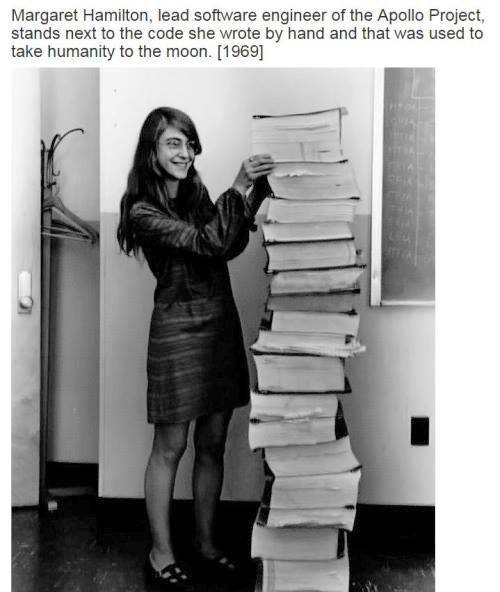Difference between revisions of "Margaret Elaine Hamilton"
| Line 19: | Line 19: | ||
Since the early 2020s a picture of Hamilton next to a stack of code has circulated widely online. The picture is often accompanied by erroneous captions that claim that this was a single listing of the code used to send men to the Moon and that she wrote the code alone. These claims are false. |
Since the early 2020s a picture of Hamilton next to a stack of code has circulated widely online. The picture is often accompanied by erroneous captions that claim that this was a single listing of the code used to send men to the Moon and that she wrote the code alone. These claims are false. |
||
| − | Many listings were stacked on top of one another to reach her height.<ref>https://www.theguardian.com/technology/2019/jul/13/margaret-hamilton-computer-scientist-interview-software-apollo-missions-1969-moon-landing-nasa-women</ref> The code was written by her and the team she led. This team developed the flight guidance software. |
+ | Many listings were stacked on top of one another to reach her height.<ref>https://www.theguardian.com/technology/2019/jul/13/margaret-hamilton-computer-scientist-interview-software-apollo-missions-1969-moon-landing-nasa-women</ref> The code was written by her and the team she led. This team developed the flight guidance software.<ref>https://news.mit.edu/2016/scene-at-mit-margaret-hamilton-apollo-code-081</ref> |
*[[File:M6vzc.jpg|400px]] |
*[[File:M6vzc.jpg|400px]] |
||
Revision as of 09:19, 26 November 2023
Margaret Elaine Hamilton (née Heafield; born August 17, 1936) is an American computer scientist, systems engineer, and business owner. She was director of the Software Engineering Division of the MIT Instrumentation Laboratory, which developed on-board flight software for NASA's Apollo program. She later founded two software companies—Higher Order Software in 1976 and Hamilton Technologies in 1986, both in Cambridge, Massachusetts.
Hamilton has published more than 130 papers, proceedings, and reports, about sixty projects, and six major programs. She invented the term "software engineering", stating "I began to use the term ‘software engineering’ to distinguish it from hardware and other kinds of engineering, yet treat each type of engineering as part of the overall systems engineering process."
On November 22, 2016, Hamilton received the Presidential Medal of Freedom from president Barack Obama for her work leading to the development of on-board flight software for NASA's Apollo Moon missions.
https://en.wikipedia.org/wiki/Margaret_Hamilton_(software_engineer)
https://news.mit.edu/2016/scene-at-mit-margaret-hamilton-apollo-code-0817
Stack of Code
Since the early 2020s a picture of Hamilton next to a stack of code has circulated widely online. The picture is often accompanied by erroneous captions that claim that this was a single listing of the code used to send men to the Moon and that she wrote the code alone. These claims are false.
Many listings were stacked on top of one another to reach her height.[1] The code was written by her and the team she led. This team developed the flight guidance software.[2]
Margaret Elaine Hamilton is a draft article and may contain little or no information on the topic but notes are available below.
This article will not be published on A Voice for Men or appear in random article selections. Wiki4Men is looking for trustworthy editors that can turn draft articles in to featured articles. Information on how to apply is on the Main Page.
In lieu of the article, the following is provided:
General Information
The main purpose of Wiki4Men is to provide a repository for information, studies, and research on men and boys and the broad range of issues affecting them, without feminist, misandric, gynocentric or woke bias. Wiki4Men also discusses issues of interest to MRAs, documents the evolution of the men's rights movement itself & misandry for posterity, and discusses issues of identity politics beyond the sphere of gender. The primary audience for Wiki4Men is MRAs, supporters of men's rights and the genuinely curious.
Starting in November 2023 topics that are more likely to be of interest to men are being added to the wiki.
The table below provides information on the number of articles in Wiki4Men.
| Category | Number |
|---|---|
| Biographies | 4,750 |
| Featured | 1,611 |
| Glossary | 474 |
| Unknown Persons | 275 |
| Information Technology | 42 |
| Draft Articles | 5,627 |
Featured articles may appear on A Voice for Men or other sites.
Wiki4Men is brought to you by A Voice for Men. More information on the wiki itself is available here. The Managing Editor is Robert Brockway.
In order to use the site, search for a term that interests you, choose from our Featured Articles or try a random article.
This site encourages publication of factual information about men and women and the cultural contexts in which they meet. It aims to be the keeper of rational and evidence-based conclusions, while rejecting popular forms of gender bigotry.
Due to licence compatibility articles may be imported from Wikipedia with appropriate attribution. These articles can then be corrected for woke bias and other problems. Generally only selected sections of articles are imported from Wikipedia as many Wikipedia articles are now so long that they obscure important information.
Wiki4Men rejects gynocentric and misandric narratives.
Draft Notes
Wikipedia
This article contains information imported from the English Wikipedia. In most cases the page history will have details. If you need information on the importation and have difficulty obtaining it please contact the site administrators.
Wikipedia shows a strong woke bias. Text copied over from Wikipedia can be corrected and improved.

